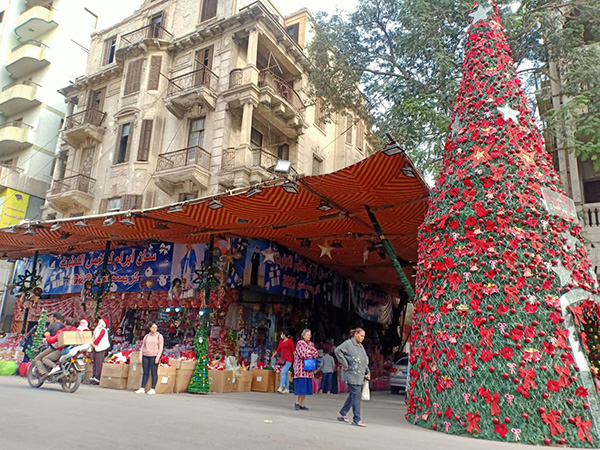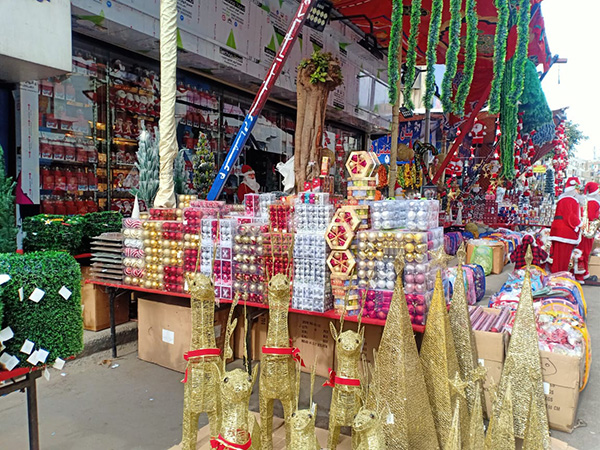By Engy Magdy, Special to The Tablet
CAIRO — With the beginning of December every year, you can see and feel the essence and spirit of Christmas worldwide: the lights, the seasonal decorations, the carols, and many other holiday-themed vibes.

Though some traditions are the same in the East or the West, the celebration of Christmas is somewhat different in Egypt, the homeland of Coptic Christians, the biggest Christian minority in the Middle East.
For Coptic Christians, the Christmas season is intensely spiritual, starting weeks before Christmas Day with a 43-day vegetarian fast, during which Christians refrain from consuming all dairy and meat products until Christmas Eve.
On Christmas Eve, Coptic Christians traditionally attend Mass, after which families gather at home to break the fast. In house after house, the tempting aromas of delicious feasts of authentic, meat-dominated Egyptian dishes fill the air.
Another important Coptic Christian tradition: every member of the family receives a new outfit.
Kahk and Eidyia
Egyptian culture and Copts’ celebrations are inevitably intertwined. One of the nicest traditions for the children and younger members of the family is when elders hand out money to them, a tradition called “Eidyia” a word derived from “Eid” in Arabic, which means “feast.” Also at Christmas, Coptic Christians bake Egyptian cookies — called “kahk” in the Egyptian dialect — as well as other varieties of baked goods. The baking of kahk, a small, round buttery biscuit covered with powdered sugar that can be stuffed with nuts, is believed to date back to ancient Egypt; old temples in Luxor and Cairo bear carvings depicting people making kahk.
In Shobra, a well-known middle-class neighborhood in north Cairo where a large population of Coptic Christians live, the sights and sounds of Christmas can be seen everywhere in the crowded streets, where many corner shops sell Christmas decorations, and Christmas hymns can be heard everywhere. As in the West, Coptic Christians buy Christmas trees and ornaments to trim them. For Copts, once again the tradition dates back to ancient Egypt, to the “tree of life,” also known as the “Ozir tree.”

“Annually, ancient Egyptians used to celebrate in front of the temple of the god Osiris, bringing the greenest trees to plant in the middle of the square crowded with poor people and kids who were waiting for presents and gifts,” said Maged Alraheeb, a Coptic historian and president of the Egyptian Society for Heritage Preservation. “People also used to put their wishes under the Ozir tree so the priests may fulfill them as possible.”
“Every pilgrim was keen to bring a seedling or a branch suitable for cultivation, planting it around the shrine as a gift to the soul of Osiris, and for the souls of their beloved ones who passed away, hoping that they would enjoy life in the vicinity of Osiris, the first martyr, according to the ancient Egyptian myth,” Alraheeb added.
Shobra is known for its Coptic, evangelist, and Catholic churches. One of its oldest churches is the Roman Catholic Basilica of Saint Theresa, built in 1931. The nearby Metro station is also named for Saint Theresa.
Spiritual celebrations
In December, during the Christmas season fast, the Coptic Church celebrates on four consecutive Sundays. Celebrated on the first Sunday is the good news given to father Zakaria of the birth of John the Baptist, known as the ambassador of the salvation message. On the second Sunday, it’s the good news of the Virgin Mary as the mother of the Savior. The third Sunday celebrates the visit of the Virgin Mary to Elizabeth. On the fourth Sunday, the birth of John the Baptist — and the big celebration — of the birth of Jesus Christ — are celebrated.
During the month leading up to Christmas certain spiritual melodies and lyrics called “Kiahk melodies” — Kiahk being the Coptic name of the month before Christmas. Celebrations during the fast are not limited to Sundays, as there are also praises and prayers, recited in Coptic and Arabic, which can last until midnight or the dawn of the next day, on Saturdays, Tuesdays, and Thursdays.
There are similar Christmas-themed practices in Egypt other than in the Coptic Church, including prayers, fasting, and charitable activities during December.
In Catholic churches, there are daily liturgical prayers, services, and sermons, as well as Christmas caroling parties. Last Sunday, the choir of Saint Joseph, one of the most prominent in Egypt, performed its annual Christmas concert, featuring 18 Christmas hymns and chants in several languages, according to Father Boutros Daniel, who leads the choir and is the manager of the Egyptian Catholic Center of Cinema.
Chronological dispute
While some Coptic Catholic churches celebrate Christmas on December 25, the majority of Coptic Christians follow the Orthodox Church in celebrating the birth of Christ on January 7. The difference in dates is not due to a theological dispute, but rather, a chronological one.
The change can be traced back to 1582 when the Roman Catholic and Eastern Orthodox churches began using different calendars. While Western churches began following the Gregorian calendar, Orthodox churches continued to follow the older Julian calendar, which is in line with the ancient Coptic calendar.
Usually, the Coptic Catholics in the north of Cairo and the Delta celebrate Christmas on December 25, while Catholics in Upper Egypt celebrate on January 7. However, the majority of families are mixed between Catholic and Orthodox or Evangelical Copts, so they celebrate both.
